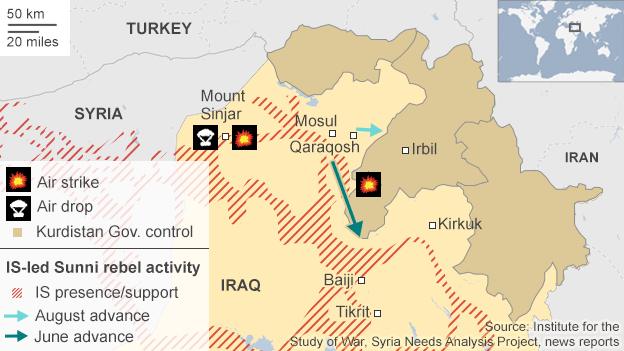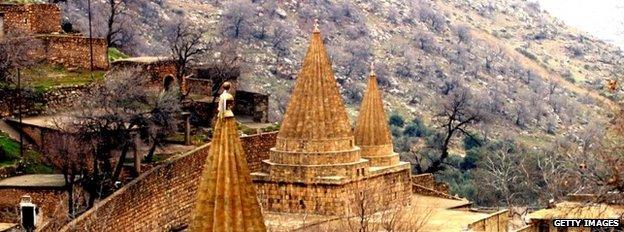Iraq aid drops to 'step up', says No 10
- Published
"People are doing what they can to offer aid", Times journalist Sara Williams who is eight kilometres from the IS frontline
The UK is to "step up" aid supplies and send more "humanitarian advisers" to parts of Iraq under threat from Islamist militants, No 10 has said.
A British military aircraft made the first drop of UK aid in Iraq overnight.
The bundle included 1,200 reusable water containers and 240 solar lanterns that can also recharge mobile phones.
Thousands of members of the Yazidi religious minority are still trapped on a mountain in northern Iraq after fleeing from Islamist militants.
A Downing Street spokesman said the situation was "deeply worrying" but that it was possible some of the people who had been trapped on Mount Sinjar might have escaped off the mountain to the north.
"A humanitarian disaster of amazing proportions", says Telegraph journalist Jonathan Krohn on Mount Sinjar
Estimates for the number of people trapped on Mount Sinjar range from 50,000 to 150,000.
'Evil terrorists'
Parallel to the UK's aid effort, US planes have been carrying out air strikes against the militants.
The US military said it had destroyed vehicles and equipment of Islamic State (IS) fighters, who had been attacking Yazidi areas.
The militant Islamist group, formerly known as Isis or Isil, has seized swathes of territory across Iraq and Syria in the past few months and has threatened Iraqi minority groups.
Downing Street said the UK government wanted to increase the number of "humanitarian advisers" in Iraq to provide better information on the situation as it developed.
The advisers will be based in Irbil - the capital of the Kurdistan region, which has been a base for foreigners and international organisations throughout more than a decade of conflict in Iraq.
They will provide advice and support on how UK aid is being used, the Department for International Development said, but gave no indication as to how many would be sent to the region.
The No 10 spokesman added: "We continue to urge Iraqi political leaders to appoint a prime minister who can lead an inclusive government.
"This is vital to ensure that Iraqis themselves are able to co-ordinate the response across the country against Isis, uniting all Iraqi communities against these evil terrorists."
Despite elections in April, Iraq's political coalition has still not decided who to put forward as its next prime minister.

The US, France and the UN are also taking part in the international aid effort.
The UK aid contribution for those displaced in Iraq is worth £13m in total. It includes:
£2m of emergency supplies for 75,000 people, which includes the aid being dropped on Mount Sinjar
£3m of fast-tracked funding for charities and NGOs already operating in Iraq
£2.5m of support for the International Committee of the Red Cross (ICRC) to provide immediate medical help
and £500,000 to help coordinate relief efforts between the UN and the Kurdish authorities in northern Iraq.
Two British C130 cargo planes were involved in dropping off the first batch of supplies.


Secretive group whose origins and ethnicity are subject to continuing debate
Religion incorporates elements of many faiths, including Zoroastrianism
Many Muslims and other groups view Yazidis as devil worshippers
Holiest temple is in Lalesh, northern Iraq (pictured above)
There are estimated to be around 500,000 Yazidis worldwide, most living in Iraq's Nineveh plains
